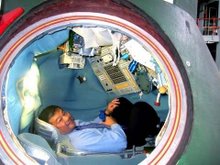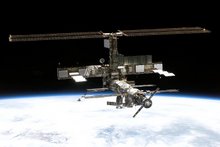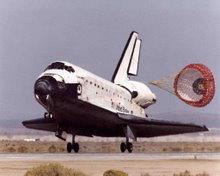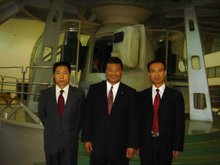I'm back in Moscow for a few meetings this week. It's always nice to come back, having lived a second life here during the years of training for Expedition 10.
It's interesting to see the Russian news coverage of the continuing events in Georgia. Not surprisingly, it paints a different picture than western news coverage.
In thinking about this, it seems to me obvious in hindsight that this conflict was not about South Ossetia or Abkhazia. The West, led by the US has been working to bring Georgia and other former Soviet Satellite countries into NATO for some time now. It is easy to see how this would make Russian leaders uncomfortable. The Russians were sending the US and Europe a message with the invasion. Even though the invasion appears to have had a negative effect for Russia (driving countries like Poland and Ukraine into the arms of the US), the message was clear. I doubt the Russian leaders expected anything else.
The Soviet Union lost the cold war and the resulting Russian Federation had a difficult time getting on it's feet through the Yeltsin years. There is a national sense of resentment and Putin reestablished Russian pride in the population. Now, Russia is striving to again be seen as a superpower.
It is important to consider all sides in any situation. If we can understand how the other guy feels, we should be able to more effectively engage them and come to a solution. However, It is difficult to see how the current crisis might end well. Russia is a significant part of the world economy (the Russian stock market felt the pain of the invasion) and our space programs are inextricably linked for at least the next few years. The US Presidential candidates have to come across as being forceful and strong against Russia at least before the election.
Russia is flexing it's newfound muscles. There are calls in the US Congress to punish Russia. An effect of this might be the end of US astronauts flying aboard Russian Soyuz spacecraft. As soon as the Space Shuttle is retired in 2010, the US would then have no way to get astronauts into space. Members of Congress are now calling for an extension of the Space Shuttle, but this would be very expensive at this point, since the system has been going through a systematic dismantling since 2005.
The US has backed itself into a corner on this one. How do we get out of it? I don't think anyone really wants a return to the cold war. But, stay tuned, that may be the result.
Leroy Chiao
Devon Island Expedition
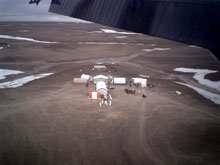
This blog features educational updates on my Devon Island Expedition of July 14-20, 2007. Other sites: spaceref.com/blogs/earthclassroom, www.marsonearth.org

Sunday, August 31, 2008
Wednesday, August 13, 2008
Georgia on My Mind
Recent Georgian and Russian military action have me thinking about the region. Strategically vital (oil pipeline), a convenient friend for the US (good way to poke Russia, having Georgia threaten to join NATO) and a historically volatile ethnic region (the Caucasus) all added up to create the situation for the current conflict in the region.
Russia will no doubt withdraw, having taught the Georgians a "lesson." I don't think they are foolish enough to want to occupy Georgia (do you remember Afghanistan?).
Was Southern Ossetia really worth going to war over? Remember that World War One started in tiny Serbia, when Austrian Archduke Francis Ferdinand was assasinated there. When tensions are high, it just takes one final spark to ignite the fire.
Unfortunately, I think the Caucasus and Russia will continue to have a stormy relationship, as they always have. Not unlike other regions in the world. It's just so sad and such a waste for people who are already in bad conditions to become further victimized by war.
Will the US and other Western powers apply sanctions to Russia? I doubt it. Russia is much more important to the US than Georgia. The US will probably make some kind of symbolic protest and then move on. After all, this war didn't stop President Bush from sitting and smiling with Vladimir Putin at the Olympics.
My thoughts go out to the victims in this war, the innocent civilians caught in the middle.
Leroy Chiao
Russia will no doubt withdraw, having taught the Georgians a "lesson." I don't think they are foolish enough to want to occupy Georgia (do you remember Afghanistan?).
Was Southern Ossetia really worth going to war over? Remember that World War One started in tiny Serbia, when Austrian Archduke Francis Ferdinand was assasinated there. When tensions are high, it just takes one final spark to ignite the fire.
Unfortunately, I think the Caucasus and Russia will continue to have a stormy relationship, as they always have. Not unlike other regions in the world. It's just so sad and such a waste for people who are already in bad conditions to become further victimized by war.
Will the US and other Western powers apply sanctions to Russia? I doubt it. Russia is much more important to the US than Georgia. The US will probably make some kind of symbolic protest and then move on. After all, this war didn't stop President Bush from sitting and smiling with Vladimir Putin at the Olympics.
My thoughts go out to the victims in this war, the innocent civilians caught in the middle.
Leroy Chiao
Friday, August 8, 2008
Astronauts, the Olympics and Politics
8/08/2008, the lucky numbers that mark the start of this year's Olympic games in Beijing! Several space explorers participated in the opening event and/or the run up to it. Cosmonaut Valentina Tereshkova and the first Malaysian in space, plus the first three Chinese National astronauts all played parts.
Conspicuously absent were US, European and Japanese astronauts. Although the Olympics were created to be a purely sporting event, the games, for the past several decades have become political arenas and a way to make political statements. This, for better or for worse.
I for one, hope that relations between the Western countries (especially the US) and China will improve soon. It doesn't make any sense to ignore or to try to isolate China. I don't defend China for much of what the country's leadership has done in the last century and the beginning of this one, but it seems more effective to engage rather than not.
Call me naive or idealistic, but my hope is that through engagement, we can improve life for everyone on the planet.
Leroy Chiao
Conspicuously absent were US, European and Japanese astronauts. Although the Olympics were created to be a purely sporting event, the games, for the past several decades have become political arenas and a way to make political statements. This, for better or for worse.
I for one, hope that relations between the Western countries (especially the US) and China will improve soon. It doesn't make any sense to ignore or to try to isolate China. I don't defend China for much of what the country's leadership has done in the last century and the beginning of this one, but it seems more effective to engage rather than not.
Call me naive or idealistic, but my hope is that through engagement, we can improve life for everyone on the planet.
Leroy Chiao
Sunday, August 3, 2008
Space X Launch Failure
Just hours ago, Space X lost it's third Falcon 1 launch vehicle. This is a shame, but it highlights the fact that rockets and spaceflight are complex, difficult endeavors. One of the puzzling facts of this launch, is that it was called Space X's first operational launch. The company had suffered two launch failures in a row, yet felt confident enough to actually put three satellites onto the third and declare the vehicle operational. That doesn't make sense to me. It reminds me of the maiden launch of the Ariane V, which also carried satellites. That rocket too was destroyed early into the flight, with the loss of all payload.
Despite all of this, I do applaud their efforts. Space X was founded in 2004 with the noble idea that there had to be a better and more efficient way to get to orbit. At the time, one major stated goal of the company was to create operational launchers by 2006 which were so efficient that the cost per pound of payload would be reduced by a factor of ten, from $10,000 per pound to $1000 per pound.
Now we are in the second half of 2008 and Space X has not yet successfully launched a rocket to orbit, let alone successfully launch payload for $1000 per pound.
All of the nations which developed successful rocket programs had spectacular failures before getting it right, including Germany, the US, Soviet Union, China, Japan and France. Currently, several countries including India, Iran and North Korea have naescent rocket programs.
If Space X stays at it, I am sure that they too, will be successful. I remain a big believer in the potential for commercial space, including commercial manned spaceflight. But, it's not going to be an easy or quick journey to success.
Leroy Chiao
Despite all of this, I do applaud their efforts. Space X was founded in 2004 with the noble idea that there had to be a better and more efficient way to get to orbit. At the time, one major stated goal of the company was to create operational launchers by 2006 which were so efficient that the cost per pound of payload would be reduced by a factor of ten, from $10,000 per pound to $1000 per pound.
Now we are in the second half of 2008 and Space X has not yet successfully launched a rocket to orbit, let alone successfully launch payload for $1000 per pound.
All of the nations which developed successful rocket programs had spectacular failures before getting it right, including Germany, the US, Soviet Union, China, Japan and France. Currently, several countries including India, Iran and North Korea have naescent rocket programs.
If Space X stays at it, I am sure that they too, will be successful. I remain a big believer in the potential for commercial space, including commercial manned spaceflight. But, it's not going to be an easy or quick journey to success.
Leroy Chiao
Subscribe to:
Posts (Atom)

